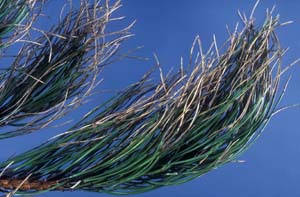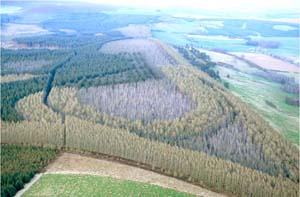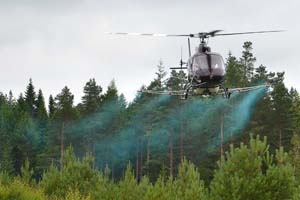Summary
Summary
The overall aim of the project was to provide a better understanding of the key barriers to adoption of DNB management recommendations and how stakeholder engagement can be improved. It aimed to identify the range of stakeholders that are important for DNB management and explore in detail the beliefs, values and practices of these stakeholders in relation to tree health. The project carried out a cost-benefit analysis to identify any financial barriers impeding the implementation of the DNB GB strategy.

Pine affected by DNB

DNB on lodgepole pine in north-east Scotland
Research objectives
This 18-month project aimed to provide social and economic evidence to support the implementation of the GB Strategy and associated country actions through three main objectives:
- To draw together new social and economic research on the barriers and opportunities of known management options and make it available so that Communications Strategy and Action Plans can be progressed.
- To identify the main stakeholders of DNB management, and understand their beliefs, values and practices around methods and the need for disease management.
- To conduct cost-benefit analyses of specific combinations of woodland type and disease status and management so that the economic position is clear and financial barriers are understood.

DNB spraying trial (Photographer – David Henderson, FC)
Results
The research has:
- Identified disease management options
- Devised four scenarios identifying possible trends and key driving forces influencing disease incidence and profitability of forest sector to test disease management options
- Documented challenges and opportunities facing pinewood managers and the wider stakeholder landscape
- Developed an economic model to test management options under different scenarios (with a focus on timber and carbon values)
Status
This research started in March 2013 and ended November 2014
Activities involved a deliberative survey on management practices and challenges relating to tree pests and diseases; modelling of cost-benefits of management practices under different scenarios; preparations for a risk communication workshop.
Publications
Contact
Funders and partners
This project was funded by Defra
Partners included: University of Bath, Scion New Zealand, University of Aberdeen, Independent researchers, Strategic Marketing Ltd, and White October
